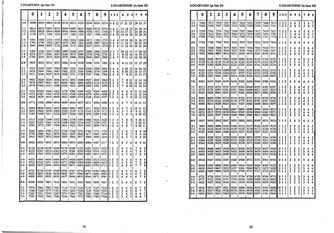|
I went to high school in Taiwan in the late 1980s. Math lessons there included - Using logarithmic tables to estimate big numbers like 385,120,089*99,751,287. - Using trigonometric tables to evaluate functions like sin(31.58 degrees). My teacher said these skills are important for college. They might have been in his time, but by the time I went to college, I used computers for these calculations. For all the time I spent on perfecting the skills of using these tables, it was a lot of stress and little/no contribution to my higher learning. I was a math professor in the 2010s. Following a national trend of de-emphasizing the integral techniques in Calculus, I revised my Precalculus course by cutting topics such as partial fraction decomposition, a challenging skill whose only use is in a special integral technique. The positive impact was almost immediate. Students no longer stressed out about or lost points on these topics, and I was able to spend more time on other important topics. There are many ways to get directions on curriculum updates, such as - Advisory board on industry needs and trends (ITEC) - The curriculum of transfer destination 4-year universities (SciMath and ITEC), or - The recommendation by national associations (SciMath and ITEC) As we update curriculum to meet current standards and expectations, we also get an opportunities to remove certain cumbersome or out-of-date materials, and replace them with new and student-friendly ones. In many cases it might be an easy win for student success when we stop teaching, testing and punishing students on some less useful but really difficult stuff. Do you update your curriculum regularly?
0 Comments
Imagine having a student who understands only 50% of the course content. When you approach the student and tell the student that he/she needs to do better, the student responds: "Are you saying that I should cheat?" That is definitely NOT the case. There are many things the student can do. For example, the student should try to improve on studying skills, work with tutors and peers, go to the professor's office hours, study longer or harder, etc. Improving courses success is a sensitive topic in higher education. Some instructors equate it to giving up academic rigor and inflating the grades to pass their students. They tend to suspect that their administrators want them to cheat.
That is also not the case. It's true that instructors are not solely responsible for student failures. And yes, there would always be students who lack preparation, who skip classes, who miss homework, and who don't appear to care at all. But as educators, we need to continue searching for ways to help students learn better. It is our commitment to the profession; it is our mission. This post is the first of a series of posts on the topic of improving course success. I do not claim to be an expert, and I welcome all questions and suggestions. The goal is for our school to keep thinking, discussing and taking actions on this important topic. Please join me on this conversation. Many people view community colleges as a place to take classes to transfer to 4-year universities. However, our best deals are our degree programs: these complete packages are worth a whole lot greater than the sum of the parts. In the November SciMath school meeting, I pushed the idea of promoting the degree programs in our school. Here are five reasons.
(1) Sense of belonging or commitment. Students do better when they have a sense of commitment. (Which student sounds more committed: "I am taking a math class" or "I am working on a math degree"?) (2) Better advising and connection. We want to nurture all of our students, but some students are easy to miss, like those who are just visiting. Even for them, there is great benefit to sign up for a major, such as access to advising, internship and scholarship opportunity, etc. (3) Broad field majors. A broad field major consists of a set of core classes and particular sets of electives tailored for different 4-year transfers. Students get a degree and the customized set of courses for their 4-year destinations, not just an assortment of classes. (4) Ahhhh the power of transfer pathways. Minnesota transfer pathways are universal articulation agreements within the entire Minn State System. Every institution, public or private, is trying to grab students through these pathways. Furthermore, many pathways lead to multiple 4-year programs. For example, Metro State has FIVE programs that take students from the same biology pathway: Biology BS and BA, Biochemistry, Environmental Science and Science Ed. (5) Better planning for the school. It's easier to schedule classes knowing students are returning, and it makes sense that we focus our resources on our majors. For example, if we run a class with 8 students, which statement makes a better case? - These 8 students need the class to get their degrees with us, or - These 8 students are visiting students who can get the course elsewhere. So, next time when you have an undeclared student, let's try this: - I know you plant to go to the U to study chemistry, but I'd like to invite you to join our chemistry major. - Sign up for a biology major and receive information about scholarship and internship opportunities! - (Your best sales pitch.) Has one of these happened to you in the last 12 months?
- Your daily function was affected because you had an illness or an emergency. - Your daily function was affected because a loved one had an illness or an emergency. - Your daily function was affected because someone you rely on had an illness or an emergency. - You felt so stressed out and took a day off or wish you could have taken a day off. Most people have had such experiences. Now, imagine overcoming the situation and trying to catch up with school work (usually in multiple courses) at the same time. That's what your students do when life happens to them. Cheryl Neudauer led a discussion on effective syllabi at our November SciMath school meeting. (Thank you Cheryl!) We can all use more knowledge about creating syllabi that help students in times of hardship. Of all things, this topic should be regularly discussed amongst us, and should be in the heart of every educator who truly cares about his/her students. At the end of Cheryl's session, I challenged everyone to find ways to help, not to punish, the students in the following two scenarios: (1) Student was ill for a week and then in recovery for another week. (2) Student does not have a textbook for the first two weeks of semester, due to financial hardship. Yes, life happens. When it happens to your students, how would you help them? Or, would you choose to help them at all? At the November school meeting, I invited everyone to think about what defines the success of our school.
- Is it the service courses we provide to other disciplines? - Is it the transfer courses we provide to visiting students? - Is it the degree programs we offer? - Is it the success of the diverse students we serve? - Is it the quality of our courses? - Is it the academic standards we uphold for our disciplines? Setting key performance indicators (KPI) and establishing work plans is not merely an administrative exercise: it is an opportunity to articulate our goals and take actions towards them. So, what defines the success of our school? Once upon a time in China, a barbarian went to give a gift to his king. When he was introduced, the barbarian proudly presented... the sunshine! Since the sunshine brings warmth even in the coldest winter, he thought, it must be a worthy gift for the king.
Being in academia is like being the barbarian in this story: even when your stuff makes sense, it can still be either trivial or unrefined. It is especially the case when you are a new dean of a band of seasoned and intelligent faculty and staff. This blog is intended for colleagues in the schools of SciMath and ITEC. Despite my best intentions, opinions expressed here can still be primitive, simply obvious, or even flawed. Nonetheless I present them with respect and sincerity. Thank you for reading. |
AuthorDr. Ben Weng Archives
September 2021
Categories
All
|




 RSS Feed
RSS Feed